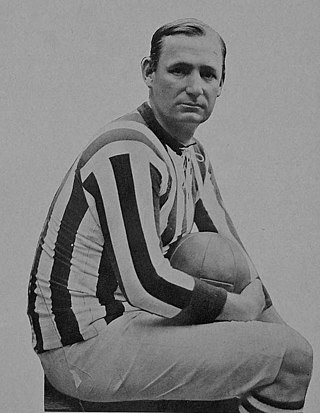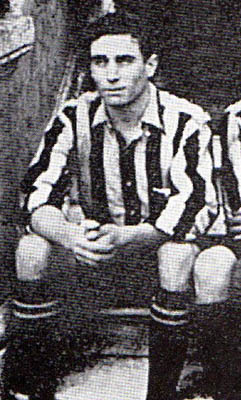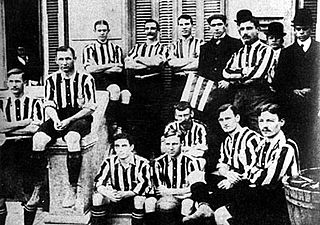
Association football is the most popular sport in Argentina and part of the culture in the country. It is the one with the most players and is the most popular recreational sport, played from childhood into old age. The percentage of Argentines that declare allegiance to an Argentine football club is about 90%.
The year 1905 in Argentine football saw Alumni crowning Argentine champion, winning its 5th league title in six seasons. A new team, Reformer Athletic Club from the city of Campana, registered to play the tournament.
1908 in Argentine football saw Belgrano AC win its 3rd. title, ending a run of three consecutive championships for Alumni.
1909 in Argentine football saw Alumni win the championship, their 8th title in 10 seasons. Argentina won all three international trophies contested against Uruguay.
1910 in Argentine football saw Alumni regain the championship, winning its 9th title in 11 seasons.
1911 in Argentine football saw Alumni regain the championship for the third time in succession, by beating Porteño in a championship playoff. It was the team's 10th title in 12 seasons and was also its last tournament disputed so the football team was disbanded at the end of the season due to financial problems.
1915 in Argentine football saw the reunification of the Asociación Argentina de Football and the Federación Argentina de Football. Racing won its third consecutive league championship.
1918 in Argentine football saw Racing Club de Avellaneda win its 6th. consecutive league title, remaining unbeaten at the end of the season.

Jorge Gibson Brown was an Argentine footballer of Scottish ancestry, who was one of the most important figures in the early years of the sport in that country. During his career, he won a total of 21 titles playing for Alumni and Quilmes and captained the Argentina national team between 1908 and 1913.

The Copa de Honor Municipalidad de Buenos Aires was an Argentine official football cup competition. It was contested fourteen times between 1905 and 1920.

The Copa de Honor Cusenier was an international football club competition which was played 13 times between representatives of the Argentina and Uruguay associations between 1905 and 1920.
1912 in Argentine football saw the division of Argentine football into two rival associations, when Federación Argentina de Football (FAF) was established to organise its own championships. Thus, Quilmes won the official AFA tournament, while Porteño won the FAF title.
1913 in Argentine football saw Racing Club de Avellaneda win its first league championship. The team also won the Copa Ibarguren, the Copa de Honor Municipalidad de Buenos Aires and the Copa de Honor Cousenier.

Alumni Athletic Club, or simply Alumni, was an Argentine football team active during the first years of the sport in that country. Although officially founded in 1898, the team had been formed in 1893 when a group of students from the Buenos Aires English High School joined Alexander Watson Hutton to form a team in order to participate in the championship organized by the Argentine Association Football League.

Carlos Arturo Lett was an Argentine footballer who played as forward. Lett played most of his career in Alumni and the Argentina national team.

José María Buruca Laforia was an Argentine association football goalkeeper. Nicknamed El Vasco, Buruca Laforia is considered the first great goalkeeper of Argentina.

The 1906 Tie Cup Final was the final match to decide the winner of the Tie Cup, the 4th. edition of the international competition organised by the Argentine and Uruguayan Associations together. For the fifth time since 1900, there were two Argentine teams in the final, Alumni and Belgrano A.C., both from the Belgrano neighborhood, that also had a strong rivalry.

The 1905 Copa de Honor Municipalidad de Buenos Aires was the final that decided the champion of the first edition of this National cup of Argentina. In the match, held in Sociedad Sportiva Argentina, Alumni defeated Quilmes 1–0 in extra time, becoming the first winner of this competition.

The 1906 Copa de Honor Municipalidad de Buenos Aires Final was the football match that decided the champion of the 2nd. edition of this National cup of Argentina. In the match, held in the Estadio Belgrano Athletic in Buenos Aires, Alumni defeated Estudiantes de Buenos Aires 3–1. to win their second Copa de Honor trophy.
The 1908 Copa de Honor Municipalidad de Buenos Aires Final was the football match that decided the champion of the 4th. edition of this National cup of Argentina. In the match, held in the Quilmes A.C. Stadium in the homonymous city, Quilmes defeated Porteño 2–1. to win their first Copa de Honor trophy.









